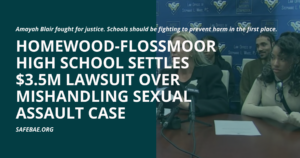Homewood-Flossmoor High School Settles $3.5M Lawsuit Over Mishandling Sexual Assault Case
Amayah Blair fought for justice. Schools should be fighting to prevent harm in the first place.
The Cost of Ignoring Survivors: Schools Keep Paying, But Students Keep Suffering
When a school fails a survivor, who really pays the price?
This week, Homewood-Flossmoor High School in Illinois reached a $3.5 million settlement in a lawsuit filed by former student Amayah Blair, who was sexually assaulted at school and then retraumatized by the school’s response. This case, like so many others, reveals a disturbing truth: schools don’t take sexual violence seriously until they’re forced to.
Survivors shouldn’t have to fight in court to be heard. They shouldn’t have to relive their trauma in depositions just to hold their school accountable. Yet time and time again, school districts refuse to listen, refuse to act, and refuse to protect students—until a lawsuit makes them. Even then, what really changes? A multi-million dollar settlement doesn’t undo the harm done to survivors like Amayah, and it certainly doesn’t prevent the next student from experiencing the same thing.
The problem is a fundamental failure to make schools safe in the first place.
What Schools Keep Getting Wrong
Schools don’t just fail survivors in one moment—they fail them at every stage, from prevention to response to accountability.
In Amayah Blair’s case, the harm didn’t end with the assault. What came next was a second betrayal—a school that didn’t listen, didn’t act, and didn’t protect her. Time and time again, we see the same patterns play out. A student speaks up about an assault, and instead of support, they are met with doubt, indifference, or even outright hostility. Administrators hesitate, not wanting to “ruin a young man’s future” or bring bad press to their school. They frame the issue as a misunderstanding, a lapse in judgment, a mistake—anything but what it really is: a failure to keep students safe.
Schools treat sexual violence as a PR problem instead of a crisis of safety and wellbeing. They prioritize protecting their own reputation over protecting survivors. Instead of taking proactive measures, they scramble to cover up incidents, push responsibility onto students, or claim their hands are tied. They lean on vague, outdated policies that fail to hold perpetrators accountable while forcing survivors to sit in the same classrooms, walk the same hallways, and relive their trauma every single day.
Even when survivors do everything “right”—reporting the harm, asking for help, seeking justice—the system still finds a way to fail them. They’re forced to advocate for themselves in rooms full of adults who see them as a problem to manage rather than a student to protect. The burden is always placed on them, while their schools quietly allow the cycle to continue.
These failures don’t just happen at Homewood-Flossmoor High School. They happen everywhere. And until schools stop treating sexual violence as a disciplinary issue and start treating it as a systemic problem requiring real prevention, nothing will change. Lawsuits and settlements will come and go, but without action, more students will continue to be harmed, retraumatized, and ignored.
Prevention is the Only Solution
Schools need to stop acting like sexual violence is inevitable—as if it’s just something that happens and can only be addressed after the fact. Prevention isn’t just possible; it’s necessary. The problem is that most schools have no real plan in place to prevent harm before it happens. They don’t teach students about consent in a way that is clear, meaningful, and reinforced throughout their education. They don’t train their faculty to recognize the warning signs of coercion, harassment, and abuse. They don’t create policies that make survivors feel safe coming forward. And they certainly don’t hold perpetrators accountable in ways that actually disrupt the cycle of harm.
This is exactly why SafeBAE works directly with schools to implement the Whole-School Approach, a model that ensures prevention is woven into every part of a school’s culture—not just a one-time assembly or an optional health class. Schools that take prevention seriously train every adult in the building to recognize and respond to sexual violence. They ensure that survivors are met with support, not skepticism. They engage students in peer-led education because research shows young people are more likely to listen to each other than to adults. They educate parents so that conversations about boundaries and respect don’t just happen at school but at home, too.
We know this approach works because we’ve seen it work. Schools that adopt real prevention strategies don’t just avoid lawsuits—they protect their students from ever experiencing this kind of harm. The question isn’t whether schools have the power to change—it’s whether they will make the choice to.
The Time for Schools to Step Up Is Now
The truth is, schools have no excuse. The research is there. The solutions exist. The only thing missing is the willingness to act. Schools can either continue the cycle of harm, waiting until another survivor has to fight for justice in a courtroom, or they can step up now and prevent the harm from happening in the first place.
SafeBAE has spent years helping schools implement the Whole-School Approach because prevention isn’t a suggestion—it’s a responsibility. Schools that work with us aren’t just checking a compliance box. They’re making a real commitment to ensuring students feel safe, heard, and protected. They’re choosing to educate their students on healthy relationships and consent, to train their staff on trauma-informed responses, and to put policies in place that center support and accountability.
This work isn’t optional. If schools truly care about their students, they will take action now—before another survivor is forced to fight for justice alone.
If you want to bring real prevention to your school, SafeBAE is here to help. Host a speaker. Start a SafeBAE club. Train your faculty. Get your school involved in real prevention.
Take action now – visit SafeBAE.org today or email us directly at info@safebae.org.


